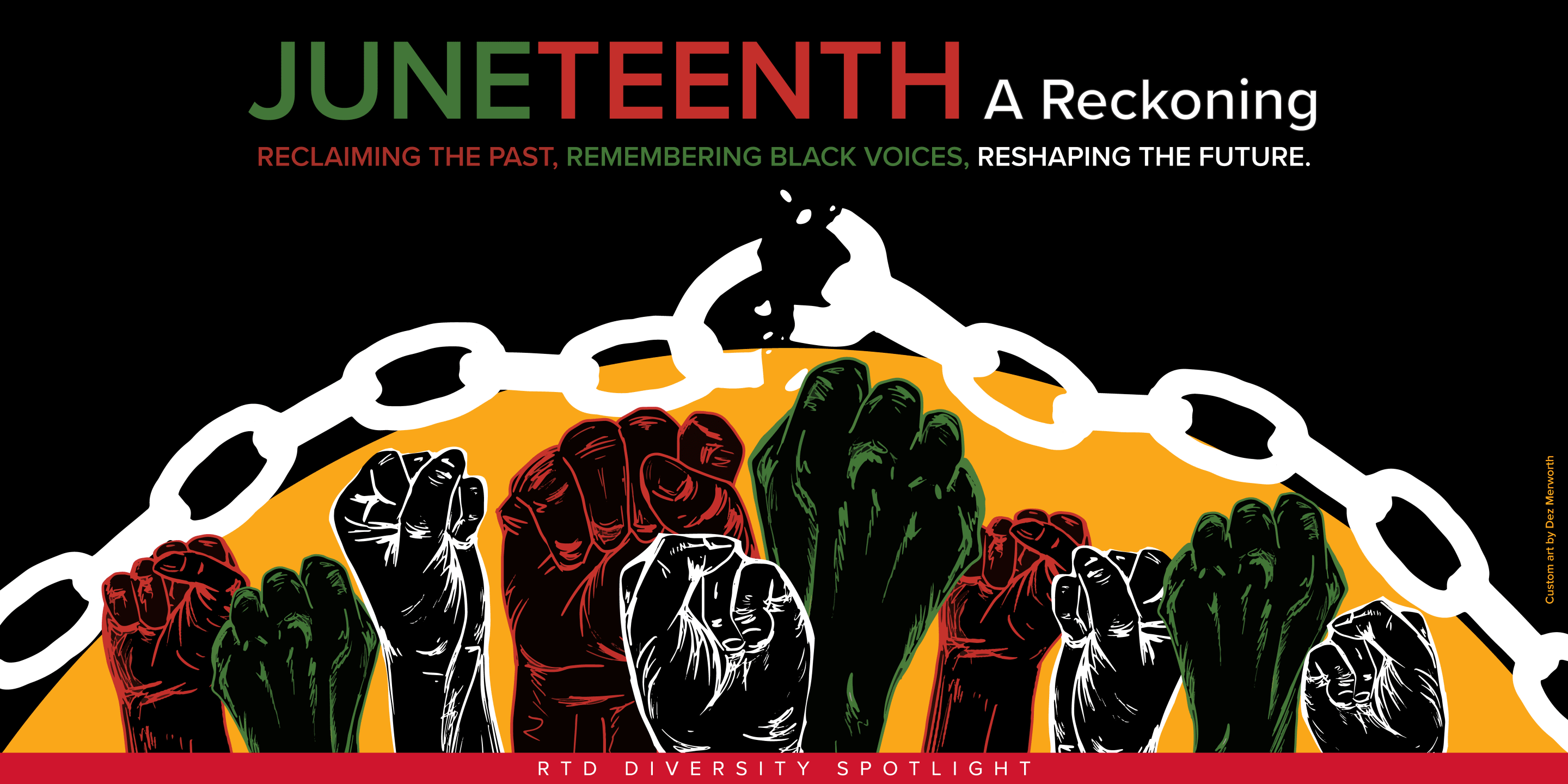
Recognizing Juneteenth and the significance of transit equity
Learn about local events commemorating Juneteenth
As we approach Juneteenth 2025 on June 19, the theme “A Reckoning: Reclaiming the Past, Remembering Black Voices, Reshaping the Future” encourages us to reflect on the journey toward freedom and justice for Black Americans. Juneteenth commemorates the emancipation of the last enslaved people in Texas on June 19, 1865, marking the end of slavery in the United States. This observance honors the resilience, contributions, and ongoing fight for justice and equity within communities.
The historical context of Juneteenth as it relates to mobility
Juneteenth can prompt a reflection of the historical barriers to mobility that Black Americans faced. During the era of slavery and beyond, Black individuals were systematically denied the freedom of movement. Segregation, discriminatory urban planning, and lack of access to public transportation left Black communities with fewer resources.
Transportation has always played a pivotal role in shaping access to opportunities. The limitations to mobility Black Americans faced underscore the need to create transportation systems that are accessible and equitable for all.Juneteenth serves as a reminder that true freedom is not only about legal rights but also the freedom and ability to access vital services and opportunities.
Black Americans who shaped transit equity
Across the nation, numerous Black Americans have significantly influenced the evolution of transit equity, fighting for access and fair treatment within public transportation systems.
- Rosa Parks – Often called the “Mother of the Civil Rights Movement,” Parks’ refusal to give up her seat on a segregated bus in Montgomery, Alabama, sparked the Montgomery Bus Boycott of 1955. This pivotal moment in American history helped dismantle segregation in public transportation and served as a cornerstone for the broader Civil Rights Movement.
- Bayard Rustin – Known for his work as an organizer and strategist behind the 1963 March on Washington, Rustin's commitment to social justice extended to improving transportation access for marginalized communities. He advocated for greater integration and access to resources in urban planning, which included transportation policies that serve communities of color.
- Dr. Charles Drew - A pioneering African American doctor who fought for equitable access to healthcare, Drew's advocacy extended to transportation, especially regarding the distribution of medical resources. His work impacted how transportation was used to facilitate access to healthcare services for underserved communities.
- Fannie Lou Hamer – A voting rights activist and leader in the Civil Rights Movement, Hamer's work involved fighting for equitable access to public spaces. She helped highlight the lack of mobility options in rural areas for Black Americans, drawing attention to the systemic inequalities in transportation access.
In Colorado, local advocates have also played crucial roles in advocating for transportation equity:
- Eddie R. Givens – Givens was a prominent figure in Colorado’s Civil Rights Movement. As a community leader, he fought for equality in many areas, including transit access. His work highlighted how segregation and unequal transportation policies disproportionately affected Black communities in Denver.
- Barney L. Ford: An escaped slave who became a prominent businessman and civil rights advocate in Colorado, Ford lobbied for the right to vote and successfully argued that Colorado should not be admitted to the Union until all males were allowed to vote. He also led efforts to establish educational programs and fought for civil rights, including advocating for non-discrimination in public accommodations.
- Ruth Denny: A civil rights leader in Denver during the 1950s and 1960s. Denny was a founding member of the Denver chapter of the Congress of Racial Equality (CORE) and led direct actions around Denver to combat racial injustice. She also initiated the "Rebels Remembered" project to compile a history of the civil rights movement in Denver, ensuring that this local history would be accessible to future generations.
- Wilma J. Webb: A distinguished member of the Colorado General Assembly from 1980 to 1993, Webb served as Colorado’s first Black First Lady when her husband, Wellington E. Webb, was Denver’s mayor. In 1998, she achieved another first as an African American woman when she was appointed to a presidential cabinet position as region 8 chief administrator for the U.S. Department of Labor.
Commemorating Juneteenth across the metro area
- Juneteenth Music Festival 2025 (June 15, 11 a.m.): Denver’s historic neighborhood, Five Points transforms into an entertainment hub to honor the day when the last enslaved people in the U.S. were freed. This festival celebrates Black culture through music and performances.
- 2025 Longmont Juneteenth (3-6 p.m. June 21): This celebration of freedom includes food, live entertainment, and community engagement, providing a space to reflect on the significance of Juneteenth and its impact.
- 5th Annual Strange Fruit of Black Excellence Gala (June 13, 6 p.m. -10 p.m.: A celebration of the Black queer community’s achievements, this event at the Denver Art Museum includes music, art, and a silent auction, offering an opportunity to connect and celebrate Black excellence.
- City of Commerce City Juneteenth Celebration (4:30-7:30pm June 19):This free event will include food, activities, vendor booths, and a variety of other attractions. Designed to be family-friendly, this celebration honors Juneteenth and recognizes the contributions of African Americans.
- City of Aurora Juneteenth Celebration (June 21, 2 -6 p.m.): A vibrant celebration that honors the historical significance of Juneteenth, bringing together residents, small businesses, nonprofits, and performers to celebrate the diversity and resilience of our community.
